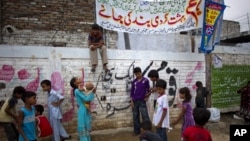Amnesty International is urging the Pakistani government to ensure the safety of a Christian girl accused of violating the country's blasphemy laws after she allegedly desecrated a religious text.
Police arrested Ramsha Masih last week after angry neighbors surrounded her house in Islamabad and accused her of burning pages inscribed with verses from the Quran. Some said she was burning papers from the garbage for cooking.
Pakistani President Asif Ali Zardari has ordered a probe into the girl's case. She is reported to be mentally handicapped and as young as 12.
On Tuesday, Amnesty International issued a statement calling on the Pakistani government to urgently reform its blasphemy laws, which carry the death penalty.
The London-based human rights group welcomed President Zardari's "swift response," but said such actions will "count for little" unless the blasphemy laws are reformed. Amnesty urged Pakistani officials to ensure the laws cannot be used to maliciously settle disputes or enable private citizens to take matters into their own hands.
Amnesty also urged Pakistani authorities to ensure that the girl and her family are protected against intimidation and attacks.
Last year, Pakistan's Minister of Minorities Shahbaz Bhatti, the only Christian member of the federal Cabinet, was gunned down in Islamabad. And Punjab province's governor, Salman Taseer, was killed by one of his bodyguards for opposing the controversial blasphemy laws.
Christians are the largest non-Muslim religious minority in Pakistan, making up about 5 percent of the population.
Police arrested Ramsha Masih last week after angry neighbors surrounded her house in Islamabad and accused her of burning pages inscribed with verses from the Quran. Some said she was burning papers from the garbage for cooking.
Pakistani President Asif Ali Zardari has ordered a probe into the girl's case. She is reported to be mentally handicapped and as young as 12.
On Tuesday, Amnesty International issued a statement calling on the Pakistani government to urgently reform its blasphemy laws, which carry the death penalty.
The London-based human rights group welcomed President Zardari's "swift response," but said such actions will "count for little" unless the blasphemy laws are reformed. Amnesty urged Pakistani officials to ensure the laws cannot be used to maliciously settle disputes or enable private citizens to take matters into their own hands.
Amnesty also urged Pakistani authorities to ensure that the girl and her family are protected against intimidation and attacks.
Last year, Pakistan's Minister of Minorities Shahbaz Bhatti, the only Christian member of the federal Cabinet, was gunned down in Islamabad. And Punjab province's governor, Salman Taseer, was killed by one of his bodyguards for opposing the controversial blasphemy laws.
Christians are the largest non-Muslim religious minority in Pakistan, making up about 5 percent of the population.





